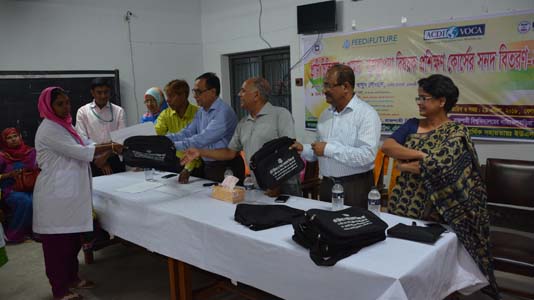RAJSHAHI, April 30, 2018 (BSS) – Academics, other scientists and researchers concerned observed imparting time-fitting training on livestock to women can be the vital means of transforming them into income generators.
They also viewed after getting training the women both rural and urban can play important role towards boosting production of animal protein to meet its existing demand of the society.
The observation came at the closing and certificate distribution ceremony of a fortnight long livestock treatment and farm management training course at Narkelbaria campus of Rajshahi University (RU) on Sunday afternoon.
Feed the Future Livestock Production for Improved Nutrition, ACDI-VOCA organized the training in association with Women Empowerment through Livestock Training Project and with financial support of USAID.
Some 25 rural women are took part in the course conducted by the teachers of Department of Veterinary and Animal Sciences of RU as resource persons.
Main thrust of the training was to bring economic emancipation of rural women together with making them competent local service providers on livestock.
RU Vice-chancellor Prof Abdus Sobhan and its Pro-VC Prof Ananda Kumar Saha addressed the ceremony as chief and special guests respectively with Prof Jalal Uddin Sarder, director of the project and a teacher of the same department.
Dean of Agriculture Faculty Prof Shaleha Jeshmin, Assistant Director of Department of Livestock Services Dr Humayun Kabir, Deputy Chief Veterinary Officer of RU Dr Hemayaetul Islam, Acting Team Leader of ACDI-VOCA Dr Abdus Salam and its gender adviser Ayesha Akter also spoke.
Prof Sobhan said imparting livestock management training to women is very effective means of intensifying women empowerment and gender balance side by side with boosting the livestock sector.
If the rural women were brought under training on livestock they will be capable of providing necessary services like production, primary treatment, deforming, vaccination and farm management.
Contribution of the livestock sector is immense in terms of eradicating the existing protein deficiency and socio economic development and there is no alternative to elevate the sector.



